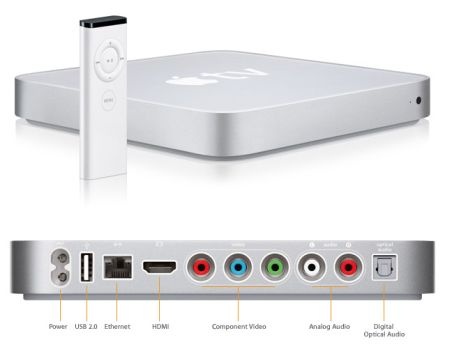AppleTV Linux Broadcom BCM4328 Wireless
I have an AppleTV 1.0 running Ubuntu 8.04 Server with an XBMC front end as a HTPC/media streamer.
The Broadcom BCM4328 wireless card in the AppleTV is not supported according to the supported devices list of the Broadcom propriety driver, but I’ve managed to get it to work.
SSH to your AppleTV and download the 32-bit driver from Broadcom:
wget http://www.broadcom.com/docs/linux_sta/hybrid-portsrc_x86_32-v5_100_82_38.tar.gz
Extract that tarball to the current directory:
tar -xvzf hybrid-portsrc*.tar.gz
Install the headers for your particular kernel:
sudo apt-get install linux-headers-$(uname -r)
Update the hardy version to a backported version of debhelper to meet a dependency:
wget http://launchpadlibrarian.net/19536572/debhelper_7.0.13ubuntu1~hardy1_all.deb sudo dpkg –install debhelper_7.0.13ubuntu1~hardy1_all.deb
Compile the Broadcom driver kernel module:
make -C /lib/modules/
uname -r/build M=pwdLoad the module into the kernel:
sudo insmod wl.ko
If successful, you should be able to see new interface, eth2 listed in
ifconfig
To scan available networks, use:
sudo iwlist eth2 scan
xbmc@appletv:/tmp$ sudo iwlist eth2 scan eth2 Scan completed : Cell 01 - Address: 12:34:56:78:90:12 ESSID:"UPC4" Mode:Managed Frequency:2.437 GHz (Channel 6) Quality:4/5 Signal level:-66 dBm Noise level:-90 dBm Encryption key:on Bit Rates:1 Mb/s; 2 Mb/s; 5.5 Mb/s; 11 Mb/s; 6 Mb/s 9 Mb/s; 12 Mb/s; 18 Mb/s; 24 Mb/s; 36 Mb/s 48 Mb/s; 54 Mb/s Cell 02 - Address: 12:34:56:78:90:00 ESSID:"BTVOYAGER2110-11" Mode:Managed Frequency:2.452 GHz (Channel 9) Quality:5/5 Signal level:-37 dBm Noise level:-88 dBm IE: WPA Version 1 Group Cipher : TKIP Pairwise Ciphers (2) : CCMP TKIP Authentication Suites (1) : PSK Encryption key:on Bit Rates:1 Mb/s; 2 Mb/s; 5.5 Mb/s; 11 Mb/s; 18 Mb/s 24 Mb/s; 36 Mb/s; 54 Mb/s; 6 Mb/s; 9 Mb/s 12 Mb/s; 48 Mb/sTo connect to a network, you must first ensure wpa-supplicant is installed:
sudo apt-get update sudo apt-get install wpasupplicant
In the case of connecting to BTVOYAGER2110-11 above, create or edit /etc/wpa_supplicant.conf to contain the following lines:
ap_scan=1 ctrl_interface=/var/run/wpa_supplicant
network={ ssid=“BTVOYAGER2110-11” scan_ssid=0 proto=WPA key_mgmt=WPA-PSK psk=“MY_WPA_PSK” pairwise=TKIP group=TKIP }
Add the following the following lines to /etc/network/interfaces to add a static IP address for the machine:
# auto eth2 iface eth2 inet static address 192.168.1.157 netmask 255.255.255.0 gateway 192.168.1.1 network 192.168.1.1 broadcast 192.168.1.255After a reboot, you should now be able to bring up this interface manually.
sudo ifup eth2
 Be careful when editing configuration files in the /etc directory. If you do not know what you are doing, you may cause your machine’s network interfaces to stay down after a reboot. In that case, you will need to physically log into one of the machine’s ttys using a keyboard, and revert your changes because you have no network access.
Be careful when editing configuration files in the /etc directory. If you do not know what you are doing, you may cause your machine’s network interfaces to stay down after a reboot. In that case, you will need to physically log into one of the machine’s ttys using a keyboard, and revert your changes because you have no network access.
Ctrl+Alt+F<1-6>
